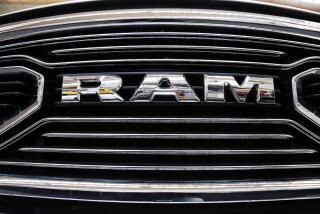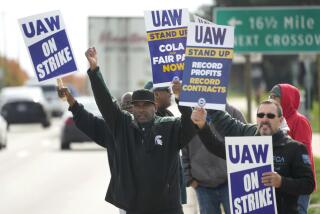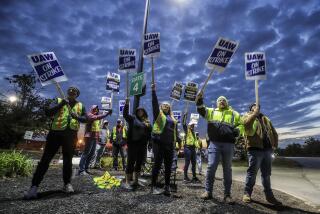Judge Defers Trial in Ford Ignition Suit
- Share via
A California judge postponed a class-action trial against Ford Motor Co. on Monday after receiving a settlement proposal under which the auto maker would agree to replace faulty ignition switches on an estimated 5 million vehicles.
Ford’s offer to settle the decades-old lawsuit was described by industry analysts as an attempt by the world’s No. 2 auto maker to minimize its potential losses and move on after months of quality setbacks.
In making the proposal, details of which were revealed Sunday, Ford also seeks to clean up a corporate image tarnished by the Firestone tire recall and continuing accusations that Ford’s best-selling Explorer sport-utility vehicles are inherently unsafe.
Ford representatives met Monday with Alameda County Superior Court Judge Michael E. Ballachey to work out a process for completing the settlement, and the company agreed not to comment further, spokeswoman Kathleen Vokes said.
But a statement that appeared briefly on Ford’s media Web site earlier Monday said the auto maker agreed to extend the warranties from 50,000 miles to 100,000 miles on a number of models with distributor-mounted ignition modules going back to the 1984 model year so certain owners could have the problem fixed free.
“We’ve had discussions on the progress of settlement talks and those talks are ongoing” was all Ballachey would tell news agency Reuters after meeting with lawyers from both sides. He scheduled another case management meeting next week.
Ford’s proposal, for now, ended the judge’s attempt to launch a jury trial over whether the auto maker used a defective design that positioned ignition modules in such a way that they overheated and caused vehicles to stall.
“The old Ford would never have owned up to this problem; they would hire a battery of high-powered lawyers and fight to the death,” said David Bradley, J.P. Morgan’s senior auto industry analyst in New York.
“The Firestone crisis and the publicity around it have led Ford to be far more accommodating to these issues than they would have been previously,” Bradley said.
Ford was at the center of last year’s recall of 6.5 million Firestone tires after scores of them were linked to fatal accidents in which they lost their treads at high speeds. Most of the recalled tires were on Ford Explorers. The auto maker has since started replacing 13 million additional Firestone tires it says are suspect, amid accusations from tire maker Bridgestone/Firestone Inc. that the Explorer also suffers from a defective design.
Other quality issues have hit the Ford brand hard in recent months, including numerous recalls of the last three models it has launched: the Focus compact car, Escape compact SUV and the all-new 2002 Explorer mid-size SUV.
Ford’s move to settle the California case is an acknowledgment that “when you have successive problems, you need to deal with them and get on with making profits and quality products to enhance shareholder value,” said Richard Hilgert, an auto analyst with Detroit brokerage firm First of Michigan.
Attorneys have estimated the cost of the proposed settlement at $750 million to $1 billion, but a Ford representative who spoke on condition of anonymity said those figures were “substantially overstated.” The cost of a ruling against Ford in a jury trial could have run into the billions of dollars, the representative acknowledged.
The lawsuit centers on Ford’s placement of the so-called thick-film ignition module, which regulates electric current to the spark plugs. In 300 Ford models sold from 1983 to 1995, the module was mounted on the distributor near the engine block, where it was exposed to high temperatures.
On Sunday, Ford said it would replace the ignition modules on all Ford vehicles nationwide that have stalled and have no more than 100,000 miles--or an estimated 500,000 to 650,000 vehicles in California and 5 million nationwide. Ford also agreed to pay for replacing ignitions that stall before the new 100,000-mile warranty has expired.
The vehicles could be fixed or reimbursements paid as early as next year.
The agreement, if accepted by Ballachey, would end years of litigation in which the judge said Ford was living in an “Alice in Wonderland” dreamland for denying that the ignition switches on about 23 million vehicles were defective.
Four months ago, Ballachey ordered up to 2 million vehicles in California recalled as part of a statewide class-action suit that sparked three separate investigations by the National Highway Traffic Safety Administration from 1984 to 1988. The federal probes did not result in any actions against Ford, but the government later determined that Ford had concealed crucial information from inspectors.
There will not be an imminent recall of Ford vehicles as a result of any action by the California court, said Rae Tyson, the traffic safety agency’s chief spokesman in Washington.
“We don’t have an active investigation,” Tyson said. “You have to open an investigation, conduct the investigation, and, then, if a recall is warranted, that would be the decision.”
Ford’s stock fell $1.03, or 4.2%, to close at $23.74 a share on the New York Stock Exchange. The decline was egged on by a downgrading of the company’s stock from “hold” to “reduce” by Wall Street firm UBS Warburg.
“While we believe Ford’s dividend is safe in 2001, the combination of cash burn with deteriorating market share and industry conditions poses a threat to dividend longevity,” UBS Warburg analyst Saul Rubin wrote in a research note to clients.






